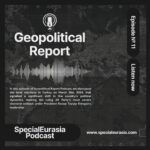Ep. 11 – Turkey’s Elections: Shifting Internal Consensus

In this episode of Geopolitical Report Podcast, we discussed the local elections in Turkey on March 31st, 2024, that signalled a significant shift in the country’s political dynamics, marking the ruling AK Party’s most severe electoral setback under President Recep Tayyip Erdogan’s leadership.
Preliminary results reveal the secular opposition Republican People’s Party (CHP) gaining control over most major cities. Notably, conservative voters have gravitated towards the ultra-nationalist National Movement Party (MHP) in the nation’s conservative heartland, while a notable number of AKP voters abstained from voting.
Currently, the Justice and Development Party maintains control in 39 out of 81 municipalities. Despite controversial electoral conditions and a strong state control over national media, the opposition secured victories in major urban areas.
The outcome achieved in Istanbul holds great significance, considering its historical importance as the capital of the Ottoman Empire, a factor strongly exploits in Erdogan’s narrative, and a prominent economic centre, with a population that wields significant influence over the country’s direction.
The elections, while local in nature, served as a personal evaluation of Erdogan’s leadership, offering further validation for his agenda. Widespread discontent in Turkey, driven by economic struggles, societal divisions, and constraints on basic rights, has led to scrutiny of Erdogan’s policies, from interest rate decisions to earthquake relief efforts.
Despite the AKP’s local defeat, Erdogan maintains control nationally, leveraging the setback to reinforce his narrative on democracy. However, concerns persist regarding the treatment of dissenters and the erosion of civil liberties.
Reflecting on Erdogan’s rise to power in 1994, parallels emerge with the current political climate. During that period, the Islamist movement gained political control, starting from Ankara and Istanbul, extending from the local to the national level. However, the electoral process’s diminished transparency reflects Turkey’s increasingly authoritarian political landscape, which might hinder such an outcome for the opposition parties.
Erdogan’s tenure has been marked by attempts to address economic challenges, albeit with limited success. His foreign policy manoeuvres, often highlighting external threats, have bolstered his image as a powerful leader while deflecting attention from domestic issues.
Despite the Turkish President’s enduring popularity, Kurdish votes played a crucial role in the election outcome, influenced in part by Selahattin Demirtaş’s endorsement of opposition candidates. While these elections have not posed a significant threat to Erdogan’s power, they underscore widespread dissatisfaction among the populace, including his supporters.
Read also | Diyanet’s Role to Promote Turkey in Central Asia and Russia |
For further analyses and paid reports on Turkey’s domestic politics, contact us at info@specialeurasia.com.
